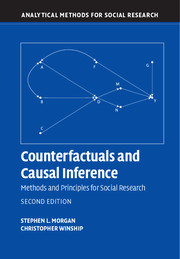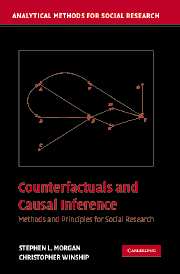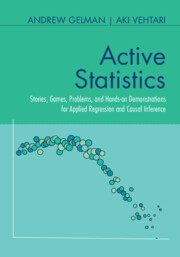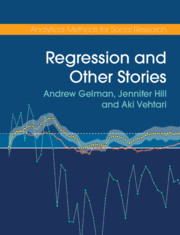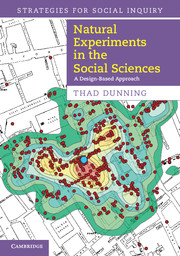Counterfactuals and Causal Inference
In this second edition of Counterfactuals and Causal Inference, completely revised and expanded, the essential features of the counterfactual approach to observational data analysis are presented with examples from the social, demographic, and health sciences. Alternative estimation techniques are first introduced using both the potential outcome model and causal graphs; after which, conditioning techniques, such as matching and regression, are presented from a potential outcomes perspective. For research scenarios in which important determinants of causal exposure are unobserved, alternative techniques, such as instrumental variable estimators, longitudinal methods, and estimation via causal mechanisms, are then presented. The importance of causal effect heterogeneity is stressed throughout the book, and the need for deep causal explanation via mechanisms is discussed.
- Examines causal inference from a counterfactual perspective
- Offers techniques for the estimation of causal effects
- Provides examples from the social, demographic, and health sciences
- The second edition has been thoroughly revised and enlarged, and is 163% of the first edition by length
Reviews & endorsements
'The use of counterfactuals for causal inference has brought clarity to our reasoning about causality. And this second edition by Morgan and Winship will bring clarity to anyone trying to learn about the field. It is an excellent introduction to the topic, and a fine place to begin learning causal inference.' Tyler J. VanderWeele, Harvard University, Massachusetts
'This improved edition of Morgan and Winship's book elevates traditional social sciences, including economics, education and political science, from a hopeless flirtation with regression to a solid science of causal interpretation, based on two foundational pillars: counterfactuals and causal graphs. A must for anyone seeking an understanding of the modern tools of causal analysis, and a must for anyone expecting science to secure explanations, not merely descriptions.' Judea Pearl, University of California, Los Angeles
'More has been learned about causal inference in the last few decades than the sum total of everything that had been learned about it in all prior recorded history. The first comprehensive survey of the modern causal inference literature was the first edition of Morgan and Winship. Now with the second edition of this successful book comes the most up-to-date treatment.' Gary King, Harvard University, Massachusetts
'The second edition of Counterfactuals and Causal Inference should be part of the personal library of any social scientist who is engaged in quantitative research. For those with a copy of the first edition, purchase of the second edition is indeed well worth the investment.' Peter Messeri, Canadian Studies in Population
Product details
No date availablePaperback
9781107694163
515 pages
253 × 176 × 28 mm
0.99kg
64 b/w illus.
Table of Contents
- Part I. Causality and Empirical Research in the Social Sciences:
- 1. Introduction
- Part II. Counterfactuals, Potential Outcomes, and Causal Graphs:
- 2. Counterfactuals and the potential-outcome model
- 3. Causal graphs
- Part III. Estimating Causal Effects by Conditioning on Observed Variables to Block Backdoor Paths:
- 4. Models of causal exposure and identification criteria for conditioning estimators
- 5. Matching estimators of causal effects
- 6. Regression estimators of causal effects
- 7. Weighted regression estimators of causal effects
- Part IV. Estimating Causal Effects When Backdoor Conditioning Is Ineffective:
- 8. Self-selection, heterogeneity, and causal graphs
- 9. Instrumental-variable estimators of causal effects
- 10. Mechanisms and causal explanation
- 11. Repeated observations and the estimation of causal effects
- Part V. Estimation When Causal Effects Are Not Point Identified by Observables:
- 12. Distributional assumptions, set identification, and sensitivity analysis
- Part VI. Conclusions:
- 13. Counterfactuals and the future of empirical research in observational social science.

